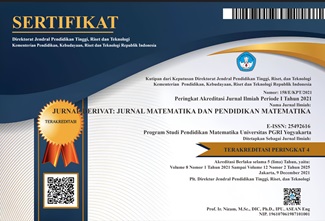Efektivitas Problem Based Learning Terhadap Literasi Matematika Siswa Introvert dan Ekstrovert
DOI:
https://doi.org/10.31316/j.derivat.v11i3.7007Abstract
This study aims to evaluate the effectiveness of problem-based learning in improving mathematical literacy, particularly in statistics, in classes dominated by introverted and extroverted students. The research employs a mixed-methods approach, combining quantitative and qualitative analysis, conducted at a private high school in Bogor. Data were collected through pretests and posttests to measure learning improvements, as well as observations during the learning process to examine interactions and student responses. The results showed that the implementation of problem-based learning significantly enhanced mathematical literacy in both classes. Although there were variations in interaction dynamics based on students' personality types, no significant difference was found in learning improvement between the introverted and extroverted classes. These findings indicate that problem-based learning can be effectively implemented for students with different personality types.
Keywords: Problem Based Learning, Mathematical Literacy, Introvert, Extrovert.
References
Anggraini, A., & Asrul. (2023). Systematic Literature Review: Kemampuan Matematika Ditinjau Dari Tipe Kepribadian Ekstrovert Dan Introvert. Euclid, 10(4), 575–586. https://doi.org/10.33603/e.v10i4.575-587
Bolstad, O. H. (2020). Secondary teachers’ operationalisation of mathematical literacy. European Journal of Science and Mathematics Education, 8(3). https://doi.org/10.30935/scimath/9551
Fadillah, F., & Munandar, D. R. (2021). Analisis kemampuan literasi statistis dalam pembelajaran matematika di masa pandemi. JPMI (Jurnal Pembelajaran Matematika Inovatif), 4(5). https://doi.org/10.22460/jpmi.v4i5.p%25p
Habe, H., & Ahiruddin, A. (2017). Sistem Pendidikan Nasional. Ekombis Sains: Jurnal Ekonomi, Keuangan dan Bisnis, 2(1), 39–45. https://doi.org/10.24967/EKOMBIS.V2I1.48
Hatadi, H., Kamarudin, M., & Ermawati, dan. (2021). Kemampuan Penalaran Matematika Kelas XI SMA Tahfidz Al-Amien Prenduan Dalam Memecahkan Masalah Statistika Ditinjau Dari Tipe Kepribadian. Jurnal Inovasi Pembelajaran Matematika, 2(2), 89–97. https://doi.org/10.36379/jipm.v2i2.164
Hendarta, M., & Isnayanti, D. (2021). Perbedaan Gaya Belajar Antara Tipe Kepribadian Introvert Dan Ekstrovert Pada Mahasiswa Fakultas Kedokteran Universitas Muhammadiyah Sumatera Utara. Jurnal Ilmiah Kohesi, 5(3), 1–6.
Jung, C., & Beebe, J. (2016). Psychological types. Routledge.
Kikomelo, S. (2024). Exploring Barriers to the Implementation of Problem-Based Learning Pedagogy in Ordinary Secondary School Mathematics in Tanzania. The Accountancy and Business Review, 16(2), 148–165.
Nafiah, Y. N., & Suyanto, W. (2014). Penerapan model problem-based learning untuk meningkatkan keterampilan berpikir kritis dan hasil belajar siswa. Jurnal Pendidikan Vokasi, 4(1). https://doi.org/10.21831/jpv.v4i1.2540
Naufal, H., & Amalia, S. R. (2022). Peningkatan Kemampuan Literasi Matematika Siswa Di Era Merdeka Belajar Melalui Model Blended Learning. Seminar Nasional Pendidikan Matematika Vol. 3 No. 1, 3.
Nur, I. (2016). Meningkatkan Kemampuan Berpikir Kreatif Matematis dan Kemandirian Belajar Siswa dengan Menggunakan Model Pembelajaran Brain Based Learning. Jurnal Pendidikan Unsika, 4(1).
Rasyada, R. (2023). Implementasi Problem Based Learning (PBL) pada Mata Pelajaran Matematika. BASICA Journal of Arts and Science in Primary Education, 3(1), 151–162.
Silalong, E. S., Nasiruddin, F. A. Z., & Jainuddin, J. (2022). Pengaruh Tipe Kepribadian Ekstrovert-Introvert Terhadap Kemampuan Berpikir Kritis Matematis Siswa Sma Negeri 18 Makassar. Embrio Pendidikan: Jurnal Pendidikan Dasar, 7(2), 88–100.
Wardah, S. N., Nurjanah, N., & Suryadi, D. (2024). Systematic Literature Review: Analisis Tipe Kepribadian Extrovert dan Introvert Terhadap Kemampuan Matematis Siswa. Indiktika: Jurnal Inovasi Pendidikan Matematika, 6(2), 294–306. https://doi.org/10.31851/indiktika.v6i2.15395
Downloads
Published
Issue
Section
Citation Check
License
Copyright (c) 2025 Chatarina Enny Murwaningtyas, Caecillia Berta Ayuwanditya

This work is licensed under a Creative Commons Attribution-ShareAlike 4.0 International License.
Authors who publish with this journal agree to the following terms:
-
Authors retain copyright and grant the journal right of first publication with the work simultaneously licensed under a Creative Commons Attribution-ShareAlike 4.0 International License that allows others to share the work with an acknowledgment of the work's authorship and initial publication in this journal.
- Authors are able to enter into separate, additional contractual arrangements for the non-exclusive distribution of the journal's published version of the work (e.g., post it to an institutional repository or publish it in a book), with an acknowledgment of its initial publication in this journal.
- Authors are permitted and encouraged to post their work online (e.g., in institutional repositories or on their website) prior to and during the submission process, as it can lead to productive exchanges, as well as earlier and greater citation of published work (See The Effect of Open Access).







